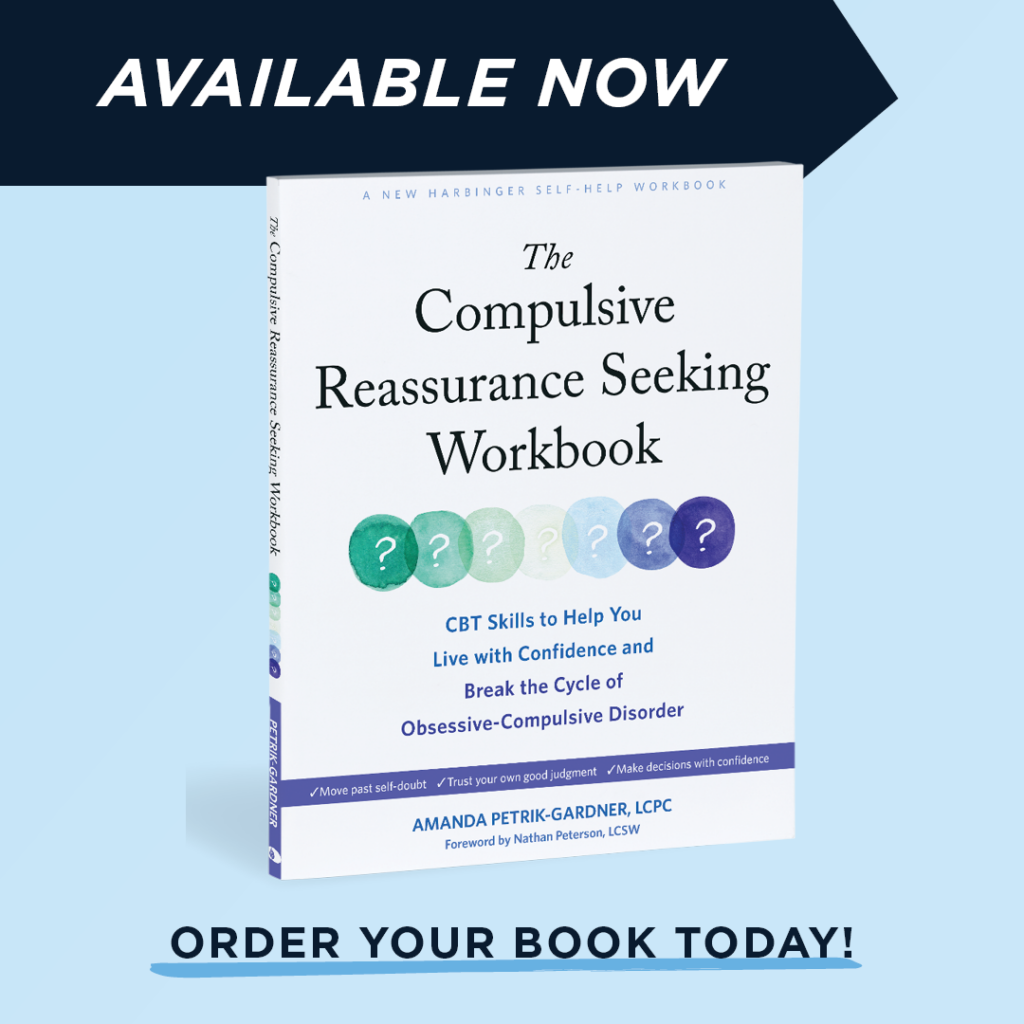Welcome! If you have found this page, you or somebody you love may be experiencing Obsessive Compulsive Disorder, and would like to learn more. Good news: OCD can be managed! There are evidence based treatments including Exposure & Response Prevention (ERP) and Inference Based CBT (I-CBT) that allow clients to live with their OCD without it consuming or debilitating their lives. Maybe this is your first time seeking treatment, or maybe you have been to countless therapists over the years and received the incorrect treatment for your OCD. Either way, I am glad you are here because there is treatment available.
Contact me at 785-477-9117 or info@amandalcpc.com for more information! Amanda can see residents of the state of Kansas, Colorado, Nebraska, Maine, Missouri, Michigan, and Florida via teletherapy.
Obsessive Compulsive Disorder
Do you ever get thoughts stuck in your head that cause distress? Or maybe it’s an image that pops up that causes you panic because it is unwanted? Obsessive-Compulsive Disorder (OCD) consists of two parts: Obsessions are the intrusive, persistent and unwanted thoughts, images, or urges that get stuck in your head, while the compulsions are the repetitive rituals (behavioral or mental) you feel you have to complete in order to relieve your anxiety. While everyone has intrusive thoughts and images pop into their head, an individual with OCD becomes distressed by theirs. They wonder, “Why did I have this thought?” “Does this mean I wanted the thought?” “Does this mean I’m a bad person?” “Does this mean I’m going to act on the thought?” “Does this mean I cannot handle it?”
Some common obsessions include:
*Contamination/Disgust-Based
*Aggression/Harm
*Suicidal OCD
*Doubting
*Religion/Moral/Scrupulous
*Symmetry/Exactness/Order/Arrangement
*Sexual Obsessions
*Sexual Orientation Obsessions
*Gender Identity
*Pedophile OCD
*Loss of Impulse Control
*Relationship
*”Just Right” OCD
*Perfectionism
*Postpartum/Perinatal
*Health/Mental Health
*Real Event
*False Memory
*Hyper-Responsibility
*Hyper-Awareness
*Death/Existential
*Meta OCD (obsessing about obsessing)
Some common compulsions include:
*Washing/cleaning
*Checking
*Locking
*Ordering/arranging/evening/moving
*Repeating/erasing/redoing
*Touching/tapping
*Confessing
*Praying
*Camouflaging
*Staring
*Superstitious behaviors
*Reassurance seeking
*Behavioral or cognitive avoidance
*Rumination/solving
*Apologizing
*Lucky words/numbers/phrases
*Cognitive restructuring
*Counting
If you did not see your obsessions or compulsion above, it does not mean it is not included! You can have intrusive thoughts about ANYTHING and any ritual can become a compulsion.
I have seen and heard it all so you are in good hands. Two of the evidence based treatments for OCD that Amanda may incorporate are Exposure and Response Prevention (ERP) and Inference Based CBT (I-CBT), in addition to utilizing components of Acceptance & Commitment Therapy (ACT). Email me at info@amandalcpc.com for more information on the treatment or to schedule.
Trainings & Memberships
Amanda Petrik-Gardner is a member of the International Obsessive Compulsive Disorder Foundation (IOCDF). Amanda has completed the Behavioral Therapy Training Institute through the IOCDF, the Pediatric BTTI through the IOCDF, ERP training through the Cognitive Behavioral Institute, and has presented at the IOCDF’s annual conferences. In addition, Amanda is on the board for OCD Kansas, an affiliate of the IOCDF, and is the creator of the OCD Exposure Coloring Books.
Resources
Click on the following links to view OCD Resources from me to you. Stay tuned for more resources!
OCD Thinking Errors
Blank OCD ERP Exposure Template
Resists/Submits to Compulsions
Response Prevention Plan for OCD
Supportive Statements When A Loved One Has OCD
ERP School by Kimberley Quinlan
OCD & Anxiety Online: Master Your OCD by Nathan Peterson
Pre-Recorded Obsessive Compulsive Disorder Webinar
Pre-Recorded Response Prevention Strategies Webinar
Pre-Recorded I-CBT Webinar
Book Recommendations
Check out my OCD Book Recommendations
The Compulsive Reassurance Seeking Workbook
The OCD Exposure Coloring Books are available on Amazon:
An OCD Exposure Coloring Book
An OCD Exposure Coloring Book: Volume 2
An OCD Exposure Coloring Book: Volume 3 for Kids
For digital downloads of the OCD Exposure Coloring Books, view my Etsy shop here. In addition to digital versions of all 3 volumes of the OCD Exposure Coloring Books, there are theme specific books including one on Harm Obsessions, Religious Obsessions, and Sex/Sexuality/Gender Obsessions.


Body Dysmorphic Disorder
Body Dysmorphic Disorder (BDD) falls into the category of Obsessive-Compulsive and Related Disorders due to its obsessive nature. BDD becomes preoccupied with a nonexistent or perceived flaw or defect in physical appearance. Or if there is an actual flaw present, the anxiety is outside the range of what is expected. The individual becomes stuck on these intrusive thoughts that there is something “wrong” in their appearance and may engage in repetitive rituals known as compulsions, possibly including mirror checking, excessive grooming, skin picking, or reassurance seeking. Possible areas of concern may be the hair, teeth, face (eyes, nose, mouth/lips), skin, breasts, buttocks, muscles, or genitalia.
Treatment is Cognitive Behavioral Therapy, which will incorporate components such as Exposure & Response Prevention and perceptual/mirror retraining.
Book Recommendations
Check out my BDD Book Recommendations
Hoarding Disorder
Hoarding Disorder falls under the category of Obsessive Compulsive and Related Disorders. It involves difficulty getting rid of possessions that may no longer be needed or useful to you. The idea of discarding items or not acquiring new items can be extremely distressing. Hoarding can cause severe impairment in functioning, strained relationships, a cluttered home, and even dangers in the home.
Treatment options for Hoarding Disorder include Cognitive Behavioral Therapy (CBT) in which the client learns new cognitive skills to process unhelpful thinking patterns that lead to hoarding. Skills such as how to sort, discard, organize, and decrease the acquiring of new items will also be beneficial.
Join our mailing list!
Receive helpful information about anxiety disorders, OCD, and Body-Focused Repetitive Behaviors!
This website may contain Amazon affiliate links.
